Native Trails Using Business as a Force for Good
Tim Blair, NT President, talks greenwashing, our B Corp Certification, and why you have to start with ‘one drop to fill the bucket’ when it comes to designing sustainable homes
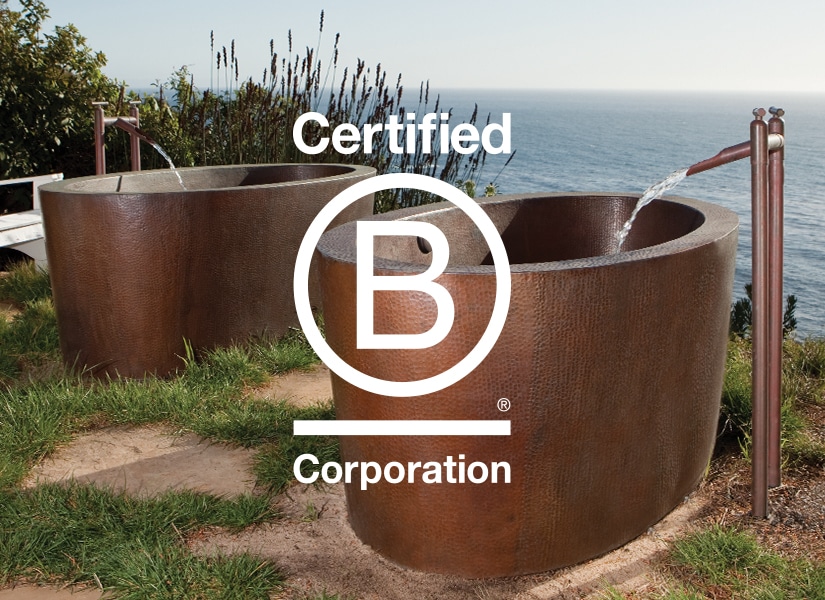
At Native Trails, we’ve always been about a triple bottom line — striving to build a company where people, the planet and profit are of equal importance. By getting B Corp certified five years ago, we wanted to ensure we were leaving no stone unturned and were looking at everything from our supply chain and input materials to our charitable giving and employee benefits.
B Corp Certification is the only certification that measures a company’s entire social and environmental performance. The B Impact Assessment evaluates how our company’s operations and business model impact our workers, community, environment, suppliers and customers. President Tim Blair, who has headed up our certification, recertification and many of our sustainability efforts over the years, talked to us about why sustainability is so important to Native Trails.
Native Trails has been B Corp certified for 5 years now! What was required to originally get certified and what’s required to stay certified?
It’s strenuous for a small business like us with many suppliers overseas. Most of the companies doing this are service companies with less to measure than manufacturers, there are only two or three others in our industry that are B Corp certified. The assessment requires so much data, from how we treat and pay our employees to our social impact locally and in the countries we work in around the globe. It looks at working conditions, all of our benefits and how we’re doing on DEI (diversity, equity and inclusion). It examines our suppliers, where everything comes from and how we’re dealing with them and whether we’re requiring them to have a level of care for their employees and for the environment.
And then there’s an environmental side on how we track our waste, water and electricity and our carbon footprint. Every couple of years they change the requirements, and most get stronger and stricter. This is just touching the surface of the assessment, there are literally thousands of things. For recertification, we appointed an in-house Sustainability Analyst who spent months working through the assessment and continues to measure and analyze our business for areas to improve.
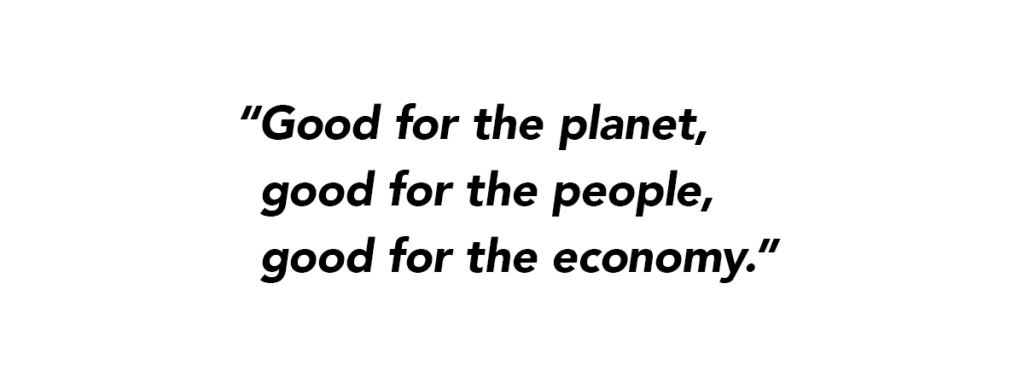
Why did Native Trails want to be certified?
We talk a lot about sustainability and do so many things that are sustainable, but we had customers asking us, “Alright, you say you’re sustainable, prove it.” So, that was one piece of it — we wanted to not only walk the talk but actually certify the talk that we’re a company that goes the extra mile to do the right things for the earth and for people. Mostly though, we just want to get better at all of it.
B Corp certification provides a roadmap for you to become one of the most sustainable companies in your industry and to become even more sustainable every year.
Sustainability has been baked into Native Trails since day one. How has the company balanced people, planet and profit since its founded in 1996?
From the beginning, what Naomi Neilson, CEO and founder of Native Trails wanted to do was to lift people up. In her travels to Mexico as a college student, she found coppersmiths who were doing beautiful artisanal work, and it was being shared a little bit here and there but not to a wider market. She thought, “I can help these people get into a much bigger market and that’ll lift them up.”
And it has! All of the artisans she started working with 28 years ago had very humble workshops. Now they have much more modern workshops and are working in ways that they probably never envisioned. When we started making copper sinks, that line grew exponentially. We were able to quickly help fund bigger workshops, safer environments for people, and better facilities for workers.
That initial part — the people side of it — really helped Naomi get into the other side of it, which is her passion for sustainability. She loves to reuse, reclaim and recycle. Knowing that the copper came from recycled materials was a big plus for her. That turned into an ethos.
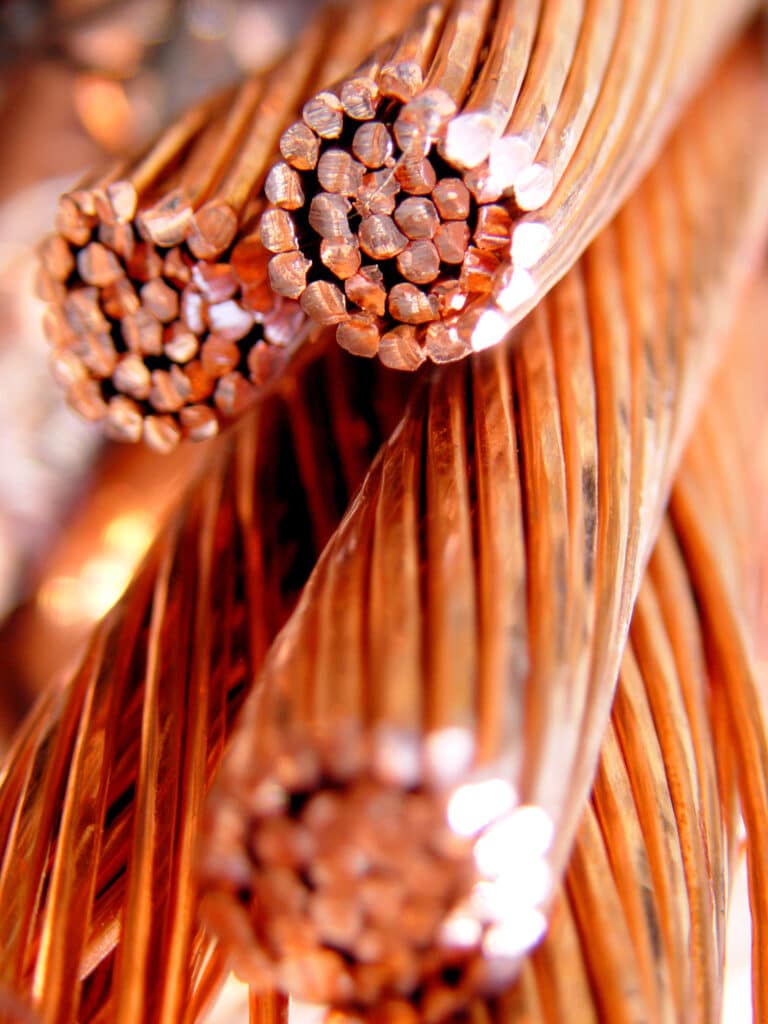
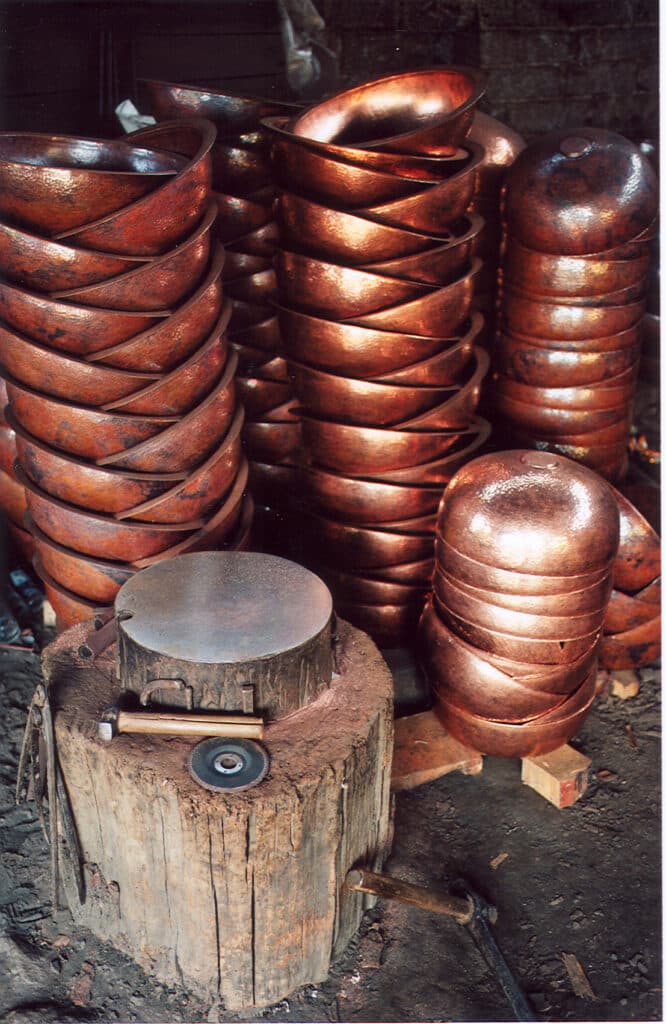
Pictured: copper scraps (left), which will be repurposed to create our copper offerings, including Maestro Collection sinks (right)
Yes, now nearly every product Native Trails makes is in some way a tribute to our planet or to the people who made it.
Starting with our recycled copper products, she searched out other artisans with a passion for sustainability and a story to tell. She met furnituremakers making vanities out of reclaimed barn and fence wood. Every time we put a reclaimed wood vanity into a home, it gives a second purpose to already existing high-quality wood and keeps it out of our landfills.
NativeStone came soon after, which uses naturally renewable jute fiber to make the concrete lighter and is safe for workers. All the while making sure those workers got paid a fair wage. Other materials popped up around the world like glass from Murano, Italy and FSC certified walnut from Eastern Europe. Locally we found a way to reuse oak winemaking materials from wineries near us which was especially fulfilling when we saw the trailer loads show up that were diverted from the landfills.
That’s part of the whole B Corp mentality — having a business for good that’s good for the planet, good for people and good for the economy. It lifts everybody up. It’s super exciting to be a part of it.
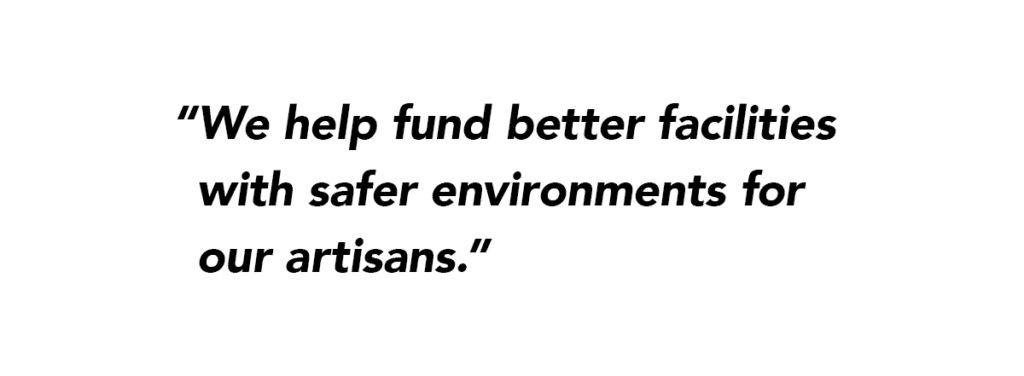
The fact that you still get excited about it after 14 years with the company is a testament to this kind of business structure. What are some ways that employees who work at Native Trails headquarters might feel the sustainability factor in the day to day?
In the warehouse and office, everyone is always thinking about sustainability and how to package better, save energy and to be more sustainably efficient. We were on the forefront of people using recycled cardboard fillers that replace Styrofoam peanuts. And we think hard before we throw anything away. Any time we have a product that comes in not up to our standards, we work to recycle it. Our building is powered by solar panels on the roof of our buildings. We have a program called Community Trails where we give paid time to employees to volunteer to do things like trail clean-up, serve meals at our local shelter, or help out at the local food bank. We look at every piece of the business to see where we can do better.

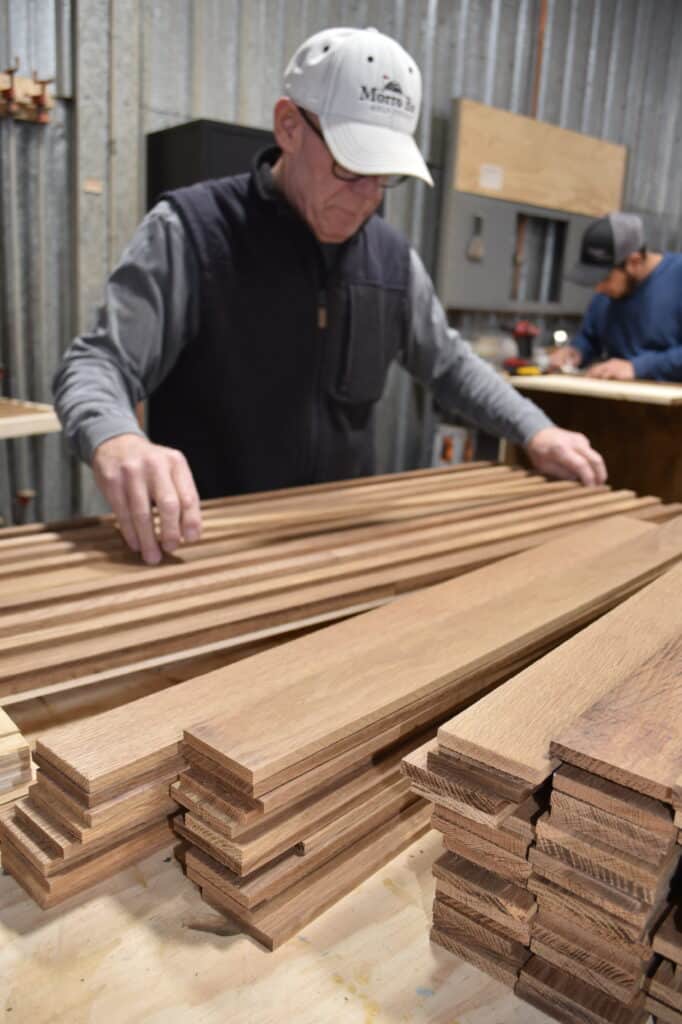
Pictured: wine stained oak staves (left), which will be processed to create vanities and mirrors in our Vintner’s Collection and Winemaker series by our in-house furniture makers (right)
There’s a lot of talk in corporate America about greenwashing, and The Wall Street Journal recently published something calling ESG a dirty word. What does Native Trails make of that?
We’re sensitive to the fact that there’s so much greenwashing out there. On the marketing side, we don’t over talk about sustainability; it’s rare for us to do something like this blog. We generally just do the good work that we want to do for the environment and people, and when we can talk about it to help others think through their processes, we do.
Walking your talk is one thing, but the walking is the most important part.
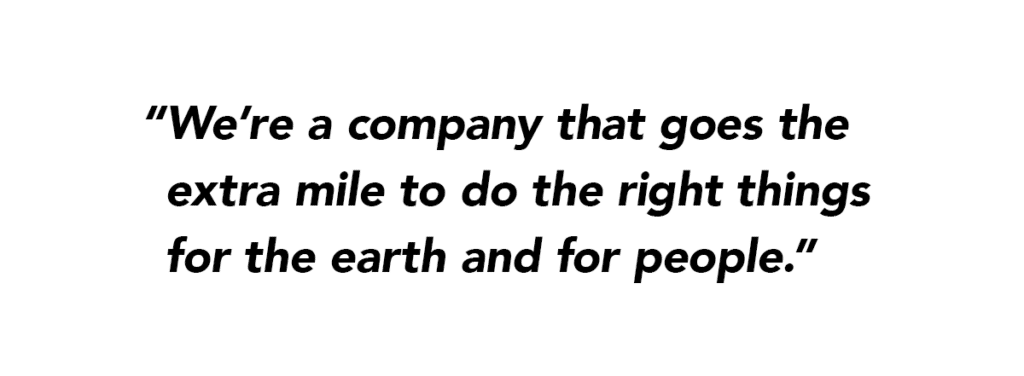
Many of our products end up in multimillion dollar homes, the construction of which creates plenty of waste. Can people feel good about buying sustainably made products even though they’re often a drop in the bucket of a big construction project like that?
You have to start with one drop to fill the bucket. That’s the way I think about it. And if they’re building a multimillion-dollar place and they see Native Trails products that are more sustainable, that furthers the environmentally conscience momentum. If we don’t offer that possibility, who will? It’s not easy to do what we do and that is one reason we are successful.
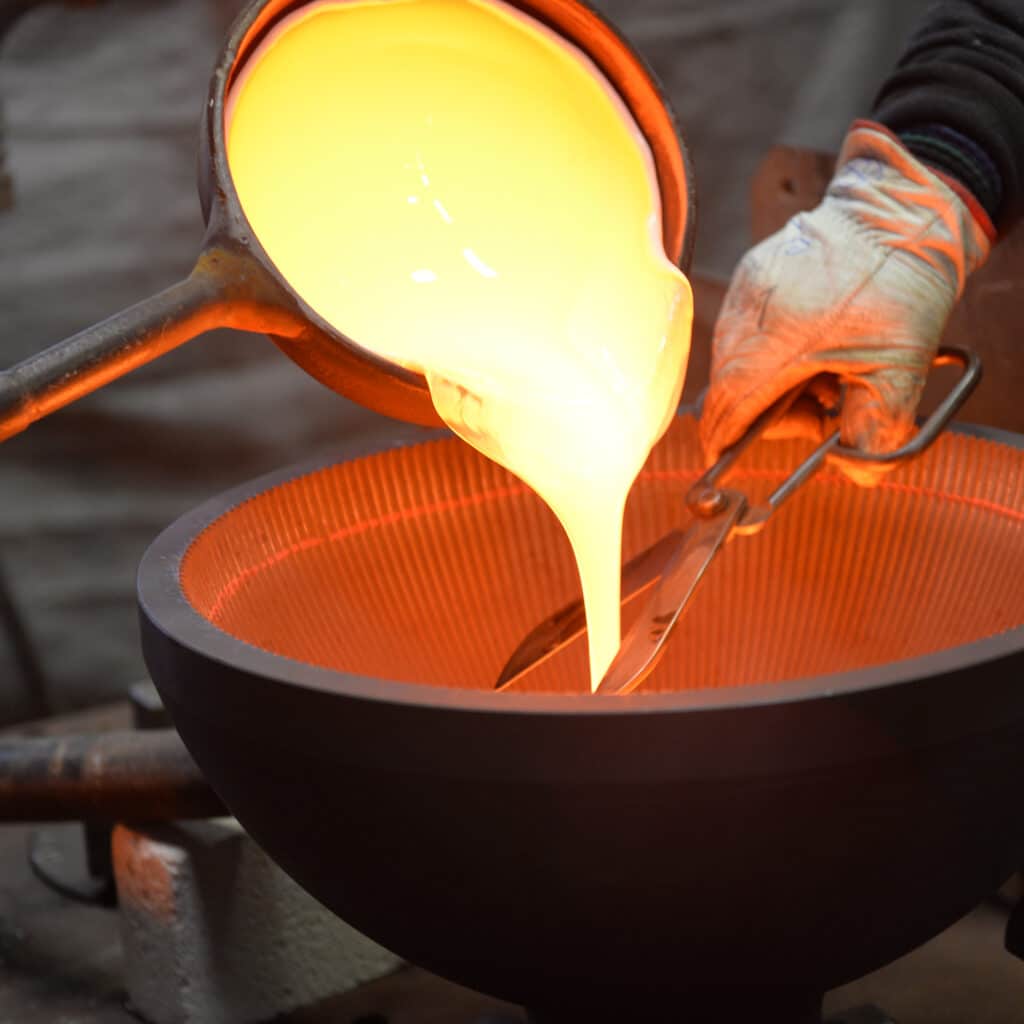
Pictured: the making of Murano glass sinks
That makes me think of the saying that every time you buy something from a small business owner, that person does a happy dance. The same goes for Native Trails’ artisans I would imagine. Having a direct impact like that doesn’t feel as accessible when you buy from a big-box hardware store.
Exactly. It’s contributing directly to small artisans who make beautiful products. That’s the most exciting thing to me, and it’s part of the B Corp model — working with people who are in disadvantaged areas and helping to grow the livelihood and self-worth of the workers who are using their talents to create amazing products. It’s so soulful.
For more information on B Corporation Certification and to see other businesses that have attained this honor, go to: https://bcorporation.net/.

